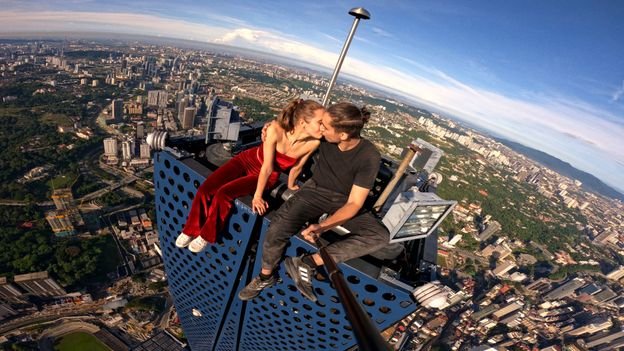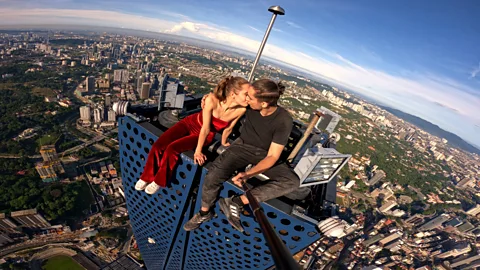 Netflix
NetflixSkywalkers, a jaw-dropping Netflix documentary featuring Angela Nikolau and Ivan Beerkus, follows the “rooftoppers” as they risk their lives for art atop the world’s tallest buildings.
A young couple are facing each other in the dawn sunshine. The man moves to lift her up, but she is hesitant.
“Don’t worry, I got you,” he assures her, as he lifts her above his head, in the pose made famous by the movie Dirty Dancing.
It’s an intimate romantic moment, that’s now shared with the rest of the world in the new Netflix documentary Skywalkers: A Love Story. What makes viewers’ stomachs churn witnessing it though, is that it takes place at the top of a 678.9m-high building, on top of a spire that’s barely 1.8m wide. And if Ivan Beerkus drops Angela Nikolau, she’ll fall into the hundred-storey abyss below, taking him with her.
The film that tells the story of this Russian pair of “rooftoppers” (the name given to their activity of climbing structures without safety equipment) is full of swooping, lurching moments, where audiences can feel that they too, are in danger of losing their footing, high above the ground. Nikolau and Beerkus are the first “couple” from this scene and arguably now the most famous, especially after they claimed to have (illegally) entered and climbed the spire of the second tallest building in the world in December 2022, the Merdeka 118 tower in Malaysia, and posted footage to prove it.
Skywalkers is partly about the journey to climb that skyscraper, but along the way Nikolau and Beerkus display both visual artistry and seeming insanity in their desire for risk. They scale frost-covered cranes dangling high above a city, take in sunsets and cityscapes from astonishing vantage points few other humans will ever share. They have a credit on the documentary for “extreme cinematography”, as much of the drone footage of their climbs belongs to them. (No wonder the first image you’ll actually see is a warning that “this film contains extremely dangerous and illegal activities. Do not attempt to imitate.”)
The story, co-directed by the US’s Jeff Zimbalist and Russian Maria Bukhonina, starts with the couple as teenagers, discovering how they began climbing. “Rooftopping” has been a subculture since the 1990s (Zimbalist says that he did it in the US as a young man) and 30-year-old Ivan Beerkus became involved in the 2010s in Moscow, where there was a thriving scene. (Some of the most relatable moments in the film are where Beerkus’s parents are begging him to get a “stable” job.)
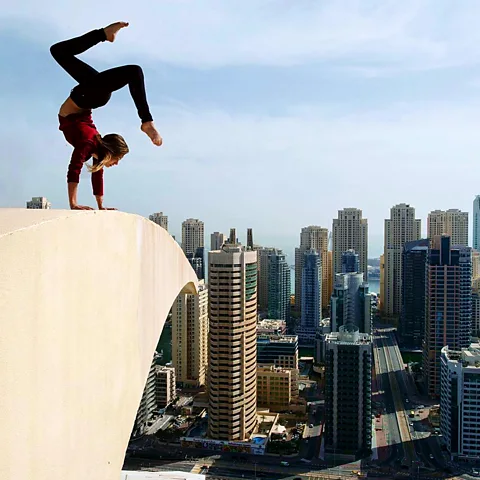 Netflix
NetflixBeerkus says in the documentary: “the higher I went, the easier it was to breathe” and tells the BBC that his thrill-seeking is part of his identity. “It gives me inspiration, it gives me motivation to live,” he says. “Once I discovered that, it’s just been something that’s come naturally.”
Angela Nikolau is the daughter of circus performers and went to art school. While the rise of Instagram and then TikTok in the 2010s and 2020s gave rooftoppers a potentially lucrative platform for posting videos, she insists their activity is for much more than clicks and fame on social media.
“Rooftopping is my art form,” she tells the BBC.
“It motivated me that I have been the first woman doing it, and I was always interested in doing something new in the art space. Every time we set up an image, we develop it as a piece of art. I choose the colours and what I will wear. Ivan chooses where the drones will fly and how the image will be shot. We perform a painting in the air every time we do it.”
With its combination of jaw-dropping imagery and attractive young protagonists, Skywalkers: A Love Story has all the elements to be a hit, like National Geographic’s 2018 film Free Solo, about climber Alex Honnold’s attempt to conquer a 900m vertical rock face at Yosemite National Park without any safety equipment. Further back, it recalls James Marsh’s 2008 documentary Man on Wire, about Philippe Petit’s 1974 stunt, performing acrobatics on a wire strung between the Twin Towers in New York. Both films went on to win best documentary feature Oscars as well as being commercial successes.
Is there something especially attractive about films featuring those who are ready to risk falling from a great height to those of us on the ground watching?
“It’s like a rollercoaster,” Nikolau says. “If you ride one, you experience a range of emotions. And we think our film will provide those sorts of emotions because it’s not just about conquering a building. You see the downsides of the sport, you see the dangers of it, but you’ll also see our relationship going up and down.
“People often tell us that when they’ve seen the movie, they say they come out of it feeling more alive than usual. So perhaps this genre provides the adrenaline that you’d get from a rollercoaster – to reboot and feel alive again.”
Free Solo also made the relationship of Honnold and his now wife, Sanni McCandless, a focal point of the narrative. The directors of Skywalkers also state that the emotion of their movie is paramount: they claim it’s not a story about the fear of falling from heights, but the fear of falling in love. Nikolau was abandoned by her father as a young child and, frequently, struggles to trust Beerkus.
“The love story was our vision from the beginning,” Zimbalist tells the BBC.
“There’s a wish fulfilment in watching humans push boundaries in ways that blow our mind. It’s inspiring. But we didn’t want to focus on this as a vertigo-inducing spectacle, we wanted to direct it towards the fear of falling in love and what that means. We felt that if we could direct it towards that, we’re making something that will reach audiences who may not be interested in the visuals of the film.”
‘There was no point in hiding’
There’s much in the story that’s not set on top of skyscrapers. Over the seven or eight years it took to make the film, the couple meet and fall in love, then leave Russia because the Ukraine invasion and the shutting down of social media meant they had no means to make an income. The Covid-19 pandemic closed down the travel industry and they lost their sponsors. They lived by selling their artwork to private bidders, but climbing Merdeka, they admit, was almost a last gamble. Rooftopping is not a career with longevity, in every sense of the word, and the film shows the couple mourning people in their community who’ve lost their lives doing it.
Angela Nikolau’s not just afraid to trust: the film shows her as visibly physically afraid during their stunts. Training in Thailand for the Merdeka event, she has a panic attack and is frozen, “paralysed” as she says, on a structure not even a metre wide, high above a city. The audience feels sick with her as Beerkus moves her limbs one at a time so that she’s in a sitting position, yet still vulnerable.
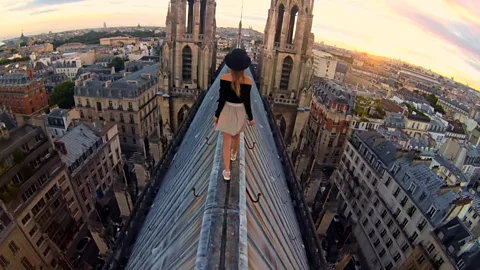 Netflix
NetflixOther times, more prosaically, they’re seen bickering on top of a tower as they climb on their quest to strike a pose. Nikolau scolds Beerkus that “you always do this” and another time complains he hasn’t taken a good photo of her legs yet.
“At the start, we wanted to avoid showing something less than a perfect relationship to the cameras,” Nikolau says. “But eventually, we got used to spending so much time with the crew and seeing them first thing in the morning and last thing at night. We realised there was no point in hiding what it is.”
That their relationship, which did begin on a commercial assignment, is real isn’t in doubt, but they’re often accused of pushing fake news or images, including immediately after their Merdeka climb.
“Oh, I love these couch critics,” Nikolau says in response. “I love it when people start saying, ‘oh no, it must have been green screen. You can tell there was a tile and a floor. You can tell it was photoshopped or she’s wearing a safety harness.’
“That actually gets us more views and be seen by more people online. I now find joy in people inventing new ways of accusing us of being fake.”
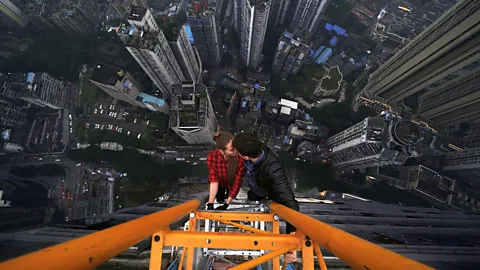 Netflix
NetflixWhile there’s a slickness to the documentary – the couple mainly speak Russian, but technology means their narration is provided in English, and the film also credits “story producers” – Zimbalist says he told those interested in backing the film that essentially, Skywalkers was guerilla film-making. Most of what the couple was doing was illegal, including getting into Merdeka 118. The documentary shows them spending about 30 hours in the building, hiding from construction workers, and filming themselves. After the successful pose on top of the tower, Zimbalist says, “we had Ivan fly the cards with the footage on it down so that if they got caught on the way down, they wouldn’t have the cards on them.”
The couple recently moved to New York in search of new opportunities. It’s a city of skyscrapers, but do they want to continue the activity of climbing them – especially as so many more security guards will, because of this documentary, recognise them? “We really hope that now the film is coming out internationally, more people would want to do collaborations with us,” Ivan Beerkus says.
“Something in the advertising commercial space, perhaps. We’d love that. But we’re also looking forward to doing other things. Angela is a painter, I write music. We’re always trying to think about new creative ways to continue to do this, while making a living off it.”
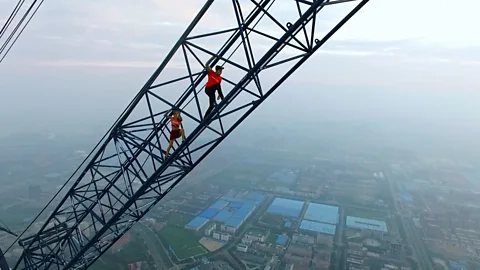 Netflix
NetflixHowever much its makers might nudge viewers towards the couple’s relationship as the story of Skywalkers, the overriding sense of awe in the film comes from watching them work under extreme mental pressure at great heights. In the scenes filmed on top of Merdeka 118, high up in the sky and with almost nothing below them, Beerkus shows a single-minded focus and determination to seize the chance of getting their shot.
“It felt like a one-in-a-million type of chance,” he says. “All my courage was flowing, I guess, and I knew I wasn’t going to drop her, and I was ready to do what we came here to do. It felt like a perfect moment. And when I lifted Angela, I remember the silence. There must have been wind that high up, but I didn’t feel anything, and I didn’t hear anything. It was just the most perfect moment of silence and zen ever.”
Skywalkers: A Love Story’ is available on Netflix from 19 July 2024

